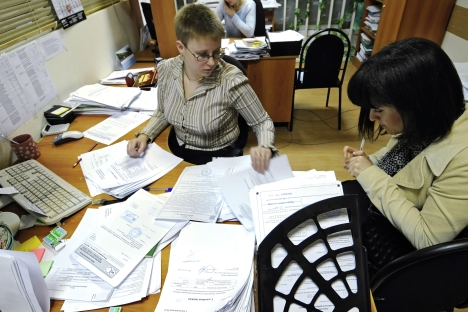Shedding light on Russia’s tax system

According to some foreign consultants, bureaucracy is one of the problem of Russia's tax system. Pictured: Legal entities submitting their tax declarations to the Central Sochi District Tax Inspectorate. Source: RIA Novosti / Mikhail Mordasov
At the end of last year, celebrated actor Gerard Depardieu, unhappy with the high rate of tax in his native France, decided to move to Russia and change his citizenship. The tax system in Russia is indeed far more dependable than in most European countries – and not just for individuals, but for legal entities, too.
However, despite the attractive rates, its reputation abroad could be better. The reason is controversial media coverage in Russia, according to Russia Consulting CEO Ulf Schneider.
Related:
Can Russia be a tax haven for wealthy Europeans?
Will Gérard Depardieu help fill Russia’s coffers?
Authorities won't increase tax burden on business - Medvedev
Yet foreigners who have lived in Russia don't complain on the country's tax system.
"As regards the letter of the law, the Russian tax system looks good. Officials are beginning to demonstrate an understanding of the economic aspects of doing business," says Schneider.
Today, profit tax in Russia is 20 percent, while, in most Western European countries, it is more than 30 percent. Income tax for individuals in Russia is 13 percent, compared with 50 percent in Germany, while France had plans to up the rate even further until the country's Constitution Court rejected the bill.
Nevertheless, Schneider argues that foreign companies need to attach great importance to tax planning, and the preparations should begin in advance, before entering the Russian market.
After selecting a particular tax regime, changing it is practically impossible. For companies, the so-called simplified system of taxation is highly beneficial, since it exempts them, for example, from VAT.
Yet Russian tax inspectors can sometimes contradict common sense as understood by European business – requiring, for instance, that only the cost of economy flights be deducted from the tax base, but not business class. However, all is not lost. In such cases, Russian courts are able to promptly resolve any dispute.
"In Russia, tax disputes get sorted out fast. There are three instances, and they can all be gone through in less than a year. Moreover, statistics show that about 70 percent of all court decisions are made in favor of the taxpayer," says Schneider.
At the same time, the consultant admits that there is no ideal tax system. For instance, one of the banes of the Russian tax system, in his view, is bureaucracy.
"Tax liabilities in Russia have a major impact on how the accounting system is run, as many documents need to be filled out. Here's an example: In the West, people are used to the fact that an invoice is a self-sufficient document. Meanwhile, in Russia, it is just a piece of paper with no particular value, and represents only an offer to pay, nothing more,” Schneider says.
“You cannot use an invoice to adjust the balance sheet or deduct expenses from the tax base. Additional documents are always required, such as an acceptance statement or a bill of lading. That's not the case in the West. Therefore, Western businesses need first to examine the list of documents required for tax deductions,” says the expert, advising businesses to employ the services not only of a local accountant, but of a consulting company, as well.
“Chief accountants in Russia are very important people in their respective companies, and CEOs here spend twice as much time with them as their EU counterparts. But, sometimes, accountants are not sufficiently forward-thinking in tax matters, so the most effective way to apply local laws is through an outside consultant,” says Schneider.
Such specialists can advise on how to avoid paying a large slice of tax when the company is opened, how to lower the tax rate on dividends, or how to reduce the tax base through accelerated depreciation of assets.
Incidentally, in comparing the Russian and French tax systems, Schneider frequently favors the former – and not just because of the low rates and court system.
"There is one aspect in which Russia far outstrips many EU countries: The well-established system of electronic documents," says Schneider. "In Russia, documents for all types of tax refunds – be it VAT or profit tax – are sent online, not by mail or courier, and the system has been in operation for five years."
"It is very efficient," he added. "In this regard, Russia can truly be described as a hi-tech society. Moreover, the country recently introduced a law requiring all document workflow between corporate taxpayers to go digital. That is a very positive step."
All rights reserved by Rossiyskaya Gazeta.
Subscribe
to our newsletter!
Get the week's best stories straight to your inbox